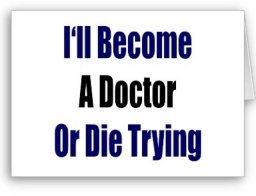Over the past few weeks, I have been writing about how to become a dentist and an optometrist in Canada. This has helped me think about the age old questions that I used to ask, such as why does it have to be so difficult getting an education?

When I got my own degree, I took time to
consider the alternatives. If I had not specialized in communications, I probably would have gone into psychology. I imagine that getting a doctorate in psychology would be a long process, but I can also see myself being fulfilled in that field as well.
The best way to get to a high level of education, such as becoming a doctor, is to start early. There are many university sites devoted to helping students do exactly that. At
Athabasca University’s website, their learner support services outline the steps that students should take. They mention that each university has different requirements regarding what they want to see in an undergraduate degree, however Athabasca University outlines that Biology, Mathematics, Organic and Inorganic Chemistry, Biochemistry, Physics, and English are usually the courses that are recommended.
All doctors in Canada need to first go through the
Medical Doctor program at an accredited university. This will take about 3 to 4 years
[1]. Then the MD can decide whether they want to go into family medicine (2 years minimum) or special post-graduate training (at least 4 years).
After all this training, it is time for the doctor’s residency. The website, the
Professional Association of Residents in Ontario (PARO) is an excellent organization for these fledgling doctors to join in this province. They advocate for their members before, during, and after residency. They are open Monday to Friday from 8:30am - 4:30pm and are located at 1901-400 University Avenue, Toronto, ON M5G 1S5. They can also be reached by phone at 416.979.1182.

The Association of Faculties of Medicine of Canada has an
article for residents on their blog entitled “
The Start of Residency - A New State of Being”. Geneviève Moineau writes that this is one of the most stressful transitions. She has some great advice for MDs that are beginning their residencies.
When I look at all that is out there ahead of doctors, I agree with Athabasca University that students need to start planning their route to medical school in their undergraduate degrees. Some schools even require
pre-med degrees for entrance to become a medical doctor.
After writing this series regarding becoming a doctor, a dentist or an optometrist, I still have questions. And that’s why I included all the links to various resources. It’s certainly not an exhaustive list. It would be impossible to list all the details in just a few articles. When studying to become a doctor, impeccable research regarding the prerequisites are the key to success. Also, when embarking on a residency, get support from an organization or even read up on the expectations others have faced.
Some of the best accolades in life are difficult to obtain. Take time to find out if this rewarding and lifesaving career is for you.

 When I got my own degree, I took time to consider the alternatives. If I had not specialized in communications, I probably would have gone into psychology. I imagine that getting a doctorate in psychology would be a long process, but I can also see myself being fulfilled in that field as well.
When I got my own degree, I took time to consider the alternatives. If I had not specialized in communications, I probably would have gone into psychology. I imagine that getting a doctorate in psychology would be a long process, but I can also see myself being fulfilled in that field as well.
 The Association of Faculties of Medicine of Canada has an article for residents on their blog entitled “The Start of Residency - A New State of Being”. Geneviève Moineau writes that this is one of the most stressful transitions. She has some great advice for MDs that are beginning their residencies.
The Association of Faculties of Medicine of Canada has an article for residents on their blog entitled “The Start of Residency - A New State of Being”. Geneviève Moineau writes that this is one of the most stressful transitions. She has some great advice for MDs that are beginning their residencies.